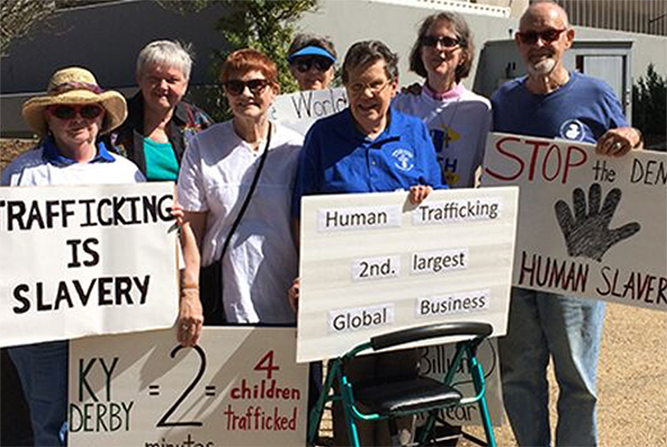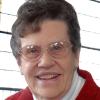Jockey Mike Smith aboard McKinzie runs down the front stretch during the 35th Breeders Cup world championships at Churchill Downs Nov. 2, 2018, in Louisville, Kentucky. (CNS/Brian Spurlock-USA TODAY Sports via Reuters)
"And they're off!" These are important words in horse racing! But nowhere are they more important than on the first Saturday of May in Louisville, Kentucky, because these words start the Kentucky Derby, the fastest two minutes in sports and the race that begins the journey toward the coveted Triple Crown.
"And they're off" are words that also echo in the world of human trafficking around the Derby, because the Derby — like other major sporting events — tends to draw those who are trafficking others in the sex trade.
"And they're off" on the roads to Louisville. It is known that ads for "companions" are multiplied in local papers and on digital platforms when the Derby comes to town. Of course, not all ads are from trafficking situations. Some come from those sex workers who are native to the area. And not all trafficking is in the sex trade. Sometimes young people are trafficked in service industries because service is needed in many areas in Derby town. Young people are used as waiters, dishwashers and hotel cleaners.
"And they're off" echoes in other places in Louisville: in the ears of those who work against the trafficking of humans in the Kentucky area. Serious and organized work began in 2012 when the Leadership Conference of Women Religious (or LCWR) Sub-Region 6 called members to address this form of human indignity — not just at Derby time, but year-round.
Good leaders that they were, these elected LCWR members delegated the details to the different justice promoters in their respective congregations. And as one might imagine, the justice promoters pulled together sisters who were interested in working in this ministry, and a committee was formed from sisters of different congregations. There were Ursulines of Louisville, Sisters of Charity of Nazareth, Dominican Sisters of Peace, and Sisters of the Presentation of the Blessed Virgin Mary.
One of the first actions of this group was to compose a letter for the leadership groups to sign. They sent the letter to hotels in their respective cities, asking hotels to be on the alert for signs of human trafficking. For those in Louisville, it was clear that hotels are busier during the Derby season.

Janet M. Peterworth, center in blue shirt, is pictured among several Ursuline Sisters and associates at a public event in Louisville, intended to raise awareness about human trafficking in the area during the Kentucky Derby. (Courtesy of the Ursuline Sisters of Louisville)
Some sisters went to hotels and "quick-stop" convenience stores and gas stations near expressway interchanges, and asked managers to put soap marked with the trafficking hot line number in restrooms and bathrooms. Others spoke with managers and gave them information on signs of trafficking to watch for, and suggestions for training their staffs.
The anti-trafficking group worked year-round, and by 2013 it seemed only natural for the sisters and their associates to "go public." So began an event that still goes on today at Sixth and Jefferson — a busy intersection in downtown Louisville.
Weeks before the Derby, local girls' high schools, the sisters and their associates engage in discussions about human trafficking and spend time creating posters and prayer experiences for a public event held on that busy corner in Louisville the Tuesday before Derby Saturday.
On that afternoon between 4 and 6 p.m. — Louisville's rush hour — students, sisters and their associates can be found holding signs and praying that trafficking be eliminated from the Derby City as quickly as mint juleps are consumed at Churchill Downs. The goal of this public event is to raise awareness of the people of Louisville about what is going on in their town right under their noses: humans being trafficked.
Advertisement
Recently the committee that has been working against trafficking started a nonprofit called PATH Coalition of Kentucky (People Against Trafficking Humans). Some religious congregations have helped with funding the organization, and three women religious serve on the present board of trustees.
PATH is now a legal entity and plans to move forward with a strategic planning process. Besides the public awareness rally during Derby week, PATH has produced numerous public education and media presentations, a public billboard opposing human trafficking, and given presentations at multiple local and national conferences. PATH members have traveled to six safe houses serving trafficked victims, developed two educational modules for the community and created marketing materials, including a website.
In January 2019, the Ursuline Sisters of Louisville's Social Concerns Committee collaborated with PATH to sponsor a workshop that explored the following questions: "What is human trafficking and what is its impact on our world, including the citizens of Kentucky?" and "How are women religious responding both globally, locally and within Kentucky?"
This workshop allowed participants to examine not just these topics, but to reflect on practical opportunities for addressing human trafficking as a global concern and to be in solidarity with PATH.





